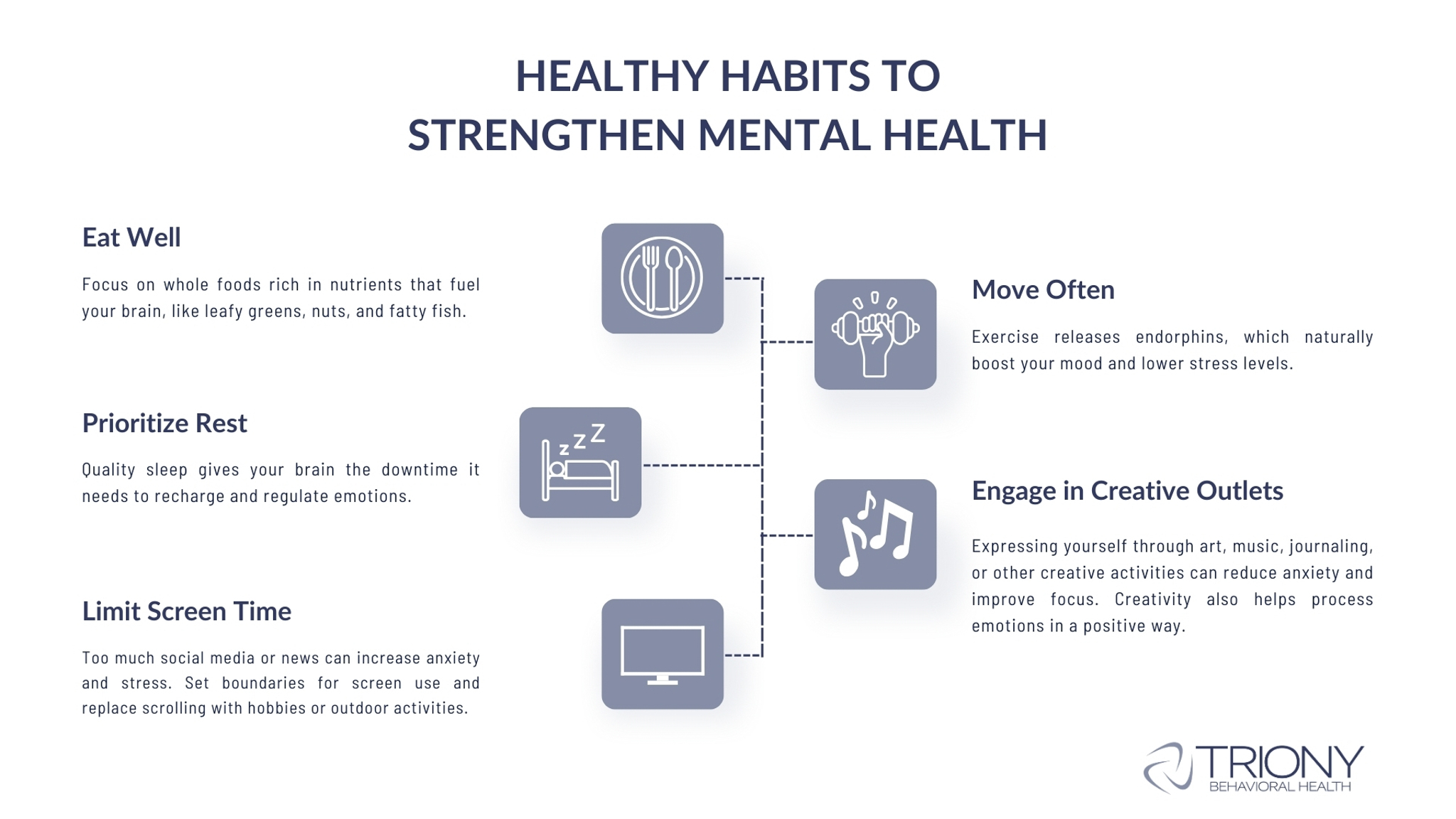Mental Health Tips for Emotional Wellness
Introduction
“Mental health…is not a destination, but a process. It’s about how you drive, not where you’re going.” – Noam Shpancer, Ph.D.
Let’s be honest, life can feel overwhelming. One minute, you’re juggling deadlines and social events, and the next, you’re lying awake at 2 a.m. replaying every awkward conversation you’ve ever had. Sound familiar? You’re not alone.
In fact, 1 in 5 adults experiences a mental health challenge each year, according to the National Institute of Mental Health. Yet, many people put mental health and emotional wellness on the back burner until burnout hits like a freight train. But here’s the good news: you can take proactive steps to improve your mental and emotional well-being. And the best part, it doesn’t require a total life overhaul.
This guide is packed with practical strategies to help you feel more grounded, balanced, and resilient. From boosting sleep quality to managing stress and strengthening social connections, we’ll cover the tools you need to protect your mental health today. Ready? Let’s dive in!
Understanding Mental Health and Emotional Wellness
What Is Mental Health and Why Does It Matter?
Mental health isn’t just about avoiding illness, it’s about thriving. It shapes how we handle stress, relate to others, and make decisions. Good mental health allows us to bounce back from challenges, while poor mental health can leave us feeling stuck or overwhelmed.
Research shows that mental health impacts physical health too. Stress, anxiety, and emotional struggles can lead to headaches, digestive issues, and even heart problems. That’s why investing in emotional wellness isn’t a luxury—it’s a necessity.
The Connection Between Mental Health and Emotional Wellness
Think of mental health as the foundation and emotional health as the framework. Mental health affects how we think and process information, while emotional health determines how we manage feelings and relationships. Together, they shape our overall well-being.
For example, if your mind is constantly racing with anxious thoughts, your emotions may feel out of control. On the flip side, building emotional resilience can help stabilize your mental outlook during stressful times.
Factors That Influence Mental Health
Some influences are out of our hands like genetics or past trauma. But there’s good news: many factors are within our control.
- Lifestyle choices: diet, exercise, and sleep habits.
- Social connections: relationships that provide support and reduce isolation.
- Mindset: practices like gratitude and mindfulness that foster positivity.
- Professional help: therapy and counseling to tackle deeper issues.
The takeaway? Small, intentional changes can have a big impact.
Building Emotional Resilience for Long-Term Stability
Healthy Habits to Strengthen Mental Health
Resilience isn’t about avoiding stress; it’s about learning to recover from it. Start by building habits that make you feel physically and emotionally strong:
- Eat Well. Focus on whole foods rich in nutrients that fuel your brain, like leafy greens, nuts, and fatty fish.
- Move Often. Exercise releases endorphins, which naturally boost your mood and lower stress levels.
- Prioritize Rest. Quality sleep gives your brain the downtime it needs to recharge and regulate emotions.
- Limit Screen Time. Too much social media or news can increase anxiety and stress. Set boundaries for screen use and replace scrolling with hobbies or outdoor activities.
- Engage in Creative Outlets. Expressing yourself through art, music, journaling, or other creative activities can reduce anxiety and improve focus. Creativity also helps process emotions in a positive way.

Practicing Gratitude and Positive Thinking
Gratitude is a game-changer. Studies show that writing down just three things you’re thankful for daily can improve happiness levels. It’s not about ignoring problems, it’s about training your brain to focus on what’s working.
Try this: at the end of each day, write down one win. It can be big or small. Over time, these moments add up, creating a mindset shift.
Developing Coping Strategies for Stress and Setbacks
Stress is inevitable, but it doesn’t have to control you. When challenges hit, take a step back and reframe the situation:
- Ask, “What can I learn from this?”
- Focus on what you can control instead of what you can’t.
- Build a toolkit of coping strategies: journaling, meditation, or even talking it out with a friend.
Managing Stress for Better Emotional Health
Recognizing Common Stress Triggers
Deadlines, financial worries, family dynamics, we’ve all been there. But stress becomes harmful when it sticks around too long. Chronic stress can lead to anxiety, depression, and even physical illness.
Spotting your triggers is the first step to managing stress effectively. Keep a journal to track what sets you off and notice patterns.
Practical Ways to Reduce Stress and Regain Balance
- Prioritize tasks. Focus on what truly matters and let go of the rest.
- Say no. Protect your time and energy by setting boundaries.
- Schedule downtime. Treat rest as a non-negotiable appointment.
Incorporating Relaxation Techniques Like Yoga and Meditation
You don’t have to be a yogi to benefit from mindfulness. Simple breathing exercises, guided meditations, and even stretching can calm your nervous system. Apps like Calm and Headspace make it easy to get started.
Improving Sleep for Mental and Emotional Clarity
The Role of Sleep in Mental Wellness
Think of sleep as a mental reset button. Lack of rest doesn’t just make you tired, it clouds your thinking and fuels anxiety. Research shows that people who sleep less than 6 hours a night are more likely to experience mental distress.
Sleep Hygiene Tips for Better Rest and Recovery
- Stick to a consistent sleep schedule.
- Limit screens and blue light before bed.
- Keep your room cool, dark, and quiet.
- Avoid caffeine in the afternoon and heavy meals late at night.
When to Seek Help for Sleep Disorders
If you’re tossing and turning despite making changes, you may need extra support. Talk to a healthcare provider about sleep studies or therapies like cognitive behavioral therapy for insomnia (CBT-I).
Mindfulness Practices to Promote Emotional Balance
How Mindfulness Reduces Anxiety and Stress
Mindfulness isn’t just a buzzword, it’s backed by science. It trains your brain to focus on the present, reducing worry about the past or future. Studies show mindfulness can lower cortisol levels (your stress hormone) and improve emotional regulation.
Simple Mindfulness Exercises to Get Started
- Breathing exercises. Inhale for 4 counts, hold for 1, exhale for 5. Repeat.
- Body scans. Pay attention to physical sensations, starting from your toes up.
- Mindful walks. Observe sights, sounds, and smells as you walk.
Integrating Mindful Living into Your Daily Routine
Start small. Take 5 minutes a day to pause and breathe. Gradually build mindfulness into daily habits, like eating meals without distractions or unplugging during your commute.
Coping with Loss and Life Transitions
Healthy Ways to Process Grief and Emotional Pain
Grief is complex and deeply personal. Give yourself permission to feel without judgment. Journaling or talking with a trusted friend can help you process emotions.
Building Support Systems During Difficult Times
- Lean on loved ones or grief support groups.
- Avoid isolating yourself—connection aids healing.
- Focus on small, meaningful activities like volunteering or honoring your loved one’s memory.
Knowing When to Seek Professional Help
If grief feels overwhelming or interferes with daily life, therapy can offer valuable tools to navigate loss.
Strengthening Social Connections for Emotional Well-Being
The Importance of Relationships for Mental Health
Humans are wired for connection. Strong relationships can lower stress and boost resilience. Studies even link social ties to longer life expectancy.
Tips for Building and Maintaining Healthy Connections
- Schedule regular check-ins with friends and family.
- Join clubs or groups that match your interests.
- Volunteer to meet new people and give back.
Final Thoughts—Taking Small Steps Toward Better Emotional Health
Improving your mental health and emotional wellness doesn’t happen overnight, but small, consistent steps can lead to big changes. Whether you’re prioritizing better sleep, practicing mindfulness, or building stronger connections, each habit you develop strengthens your mental resilience. Remember, progress is more important than perfection.
If you’re feeling overwhelmed or unsure where to start, you don’t have to face it alone. Triony Behavioral Health is here to help. Our compassionate team offers personalized support to guide you through life’s challenges. Call us today at 1-888-689-1432 to take the first step toward better mental health.
Schedule consultation
Building a Foundation of Trust and Support
"In the midst of chaos, there is also opportunity." At the core of our services lies a deep commitment to creating a safe, supportive environment. We believe that a strong support system is crucial for healing and growth. Our team of compassionate professionals is dedicated to walking alongside you, offering guidance and understanding at every step of your journey.





